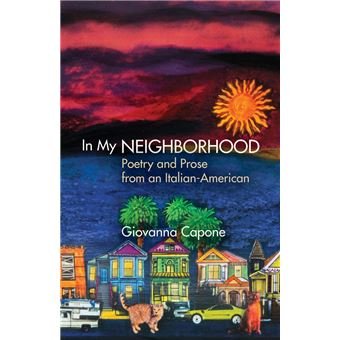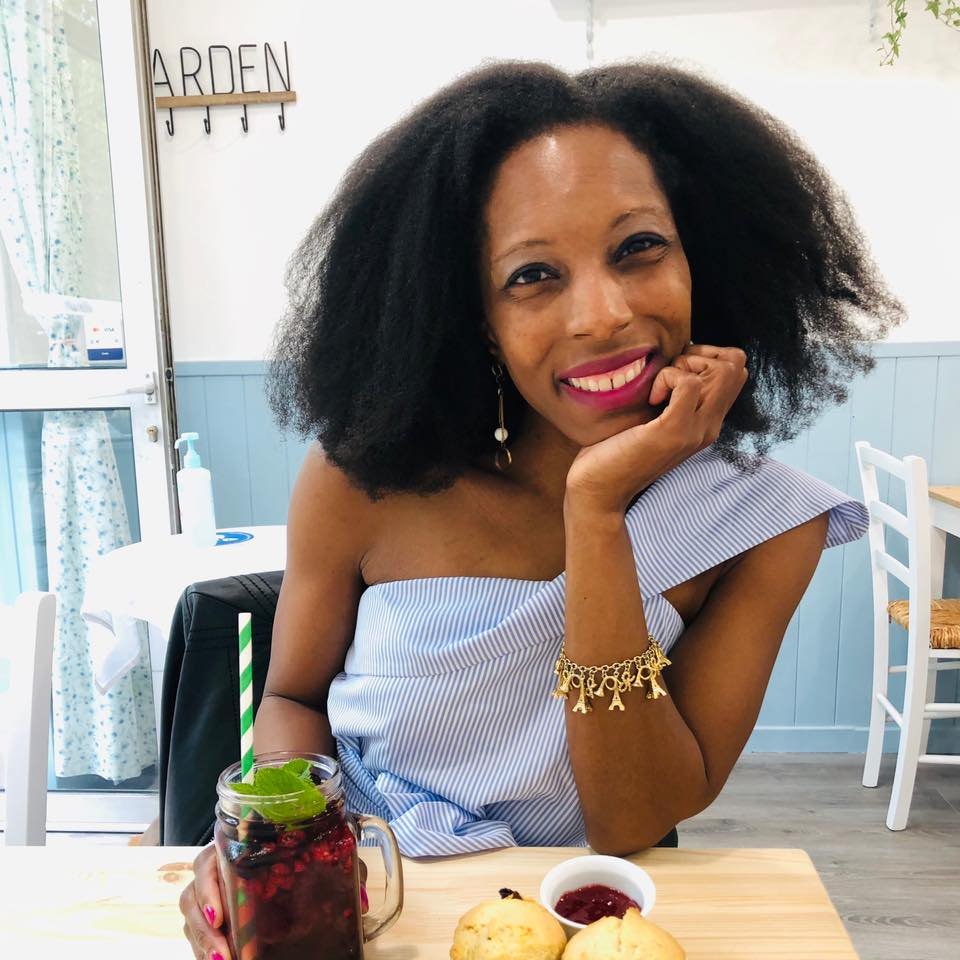What Makes Poetry Good
As a young woman Giovanna Capone had no interest in poetry. The words and poets she was first introduced to in school left her empty, with nothing to relate to as an Italian-American woman reading about the world mostly from the perspective of “dead, white men.”
Lyndon B. Johnson once said the United States is a nation of nations. But although “we pride ourselves in being a melting pot,” Capone says, “it’s not reflected in our school curriculum. I was never taught the full diversity of American cultures in my school years. A lot was lacking in what we were taught.” Capone quickly figured out that if she wanted to learn more about her Italian-American roots, she would have to educate herself.
After her formal education ended, she spent a lot of time in her thirties reading about her Italian-American history, which helped her to find and develop her own poetic voice. In My Neighborhood: Poetry and Prose from an Italian-American (Bedazzled Ink Publishing Company) reflects two decades of her thoughts and writing. It is a nuanced, poetic canvas of Capone’s Italian upbringing, her emerging political consciousness, her growth as a feminist, and her coming out years as a lesbian. She paints an especially vivid picture of her upbringing: “I envision myself in my family mosaic and explore how I’ve carried that forward today.”
In My Neighborhood is Capone’s first full-length book of poetry and prose, which she will read from on April 16 at Alley Cat Books in San Francisco, for At The Inkwell’s National Poetry Month reading series. Her work has been previously published in anthologies such as Curaggia: Writing by Women of Italian Descent, Bless Me Father: Stories of Catholic Childhood, Unsettling America: An Anthology of Contemporary Multicultural Poetry, Avanti Popolo: Italian-American Writers Sail Beyond Columbus, and Queer View Mirror 2, to name a few. This new book contains much of her previously anthologized work in one collection.
Since January, Capone, who is 56 but looks 35, has been mailing copies of her book to family and friends across the world. “It has been long overdue. I’ve been giving readings for many years, and I have read these poems to various audiences in New York, Texas, and California. But this publication is the first time all of them appear in one book.” Capone says. “When I was going through the process of ordering the poems, I really saw the strong narrative element of my book. It’s kind of like a memoir written in poetry.”
Her predominant themes deal with culture and ethnic identity. Many of the poems are actual family stories told by her parents and elder relatives, so Capone’s poetry is a means of chronicling, in written words, these family histories re-told over and over through the generations.
Originally from Mount Vernon, New York, Capone admits she still feels like a New Yorker although she has lived in the San Francisco Bay area for over 20 years. It’s no surprise to anyone that the Italian-American population is less dominant in Northern California than it is in New York, but for Capone, moving out west as a young adult was a culture shock she’s still experiencing the effects of.
Although her parents were both born in the U.S. they embodied an old world mentality, she says. “They were raised by immigrant Italians, my four grandparents who were newly arrived from Italy. Their way of life was passed from one generation to the next. There was a continuity of values and culture and it was strong. Also, I was raised in a very ethnically identified and insular Italian neighborhood. Immigrants from southern Italy settled and lived amongst each other. They brought their old world ways to America in countless ethnic neighborhoods like the one in which I was raised.
“I didn’t fully realize this until I got older and left New York. Once I had lived in a few places and developed a broader frame of reference, I realized in retrospect how steeped I was in those old world Italian values as a child. They left an indelible impression and gave me a solid sense of my roots and culture, for which I’m very grateful. This immigrant sensibility and history is what I write about in the first part of the book.”
Like a fish who has no concept of water, Capone said she took that milieu for granted in a way. Once she relocated to California, she was no longer in her ethnic hub. “I often realized that the people around me had no cultural context for who I am. They didn’t get who I was. People might come up to me and start talking in Spanish, or say “Habla espanol?” or often they just didn’t know what to think of me.” That’s when she realized that she was experiencing a culture shock. “I think the effects of living life in America can be very assimilating to any minority culture. Many of us experience this invisibility.”
Ironically, although she moved to California to live a freer life as a gay person, she felt lonely as an Italian-American. This pushed her to learn more about her roots. Soon afterward, Capone formed, with a fellow Italian-American lesbian from New York, a support group in the late 80s. They coined the name BASIL (Bay Area Sicilian and Italian-American Lesbians). It was a social and cultural group which met monthly over meals to share stories and memories about their families and their heritage. BASIL lasted 22 years and was composed of members from seven different counties in Northern California. They also started a monthly newsletter, came up with a BASIL table blessing, and they marched for several years in various San Francisco gay pride events. At one point they formed an offshoot of the group and hired a native Italian language speaker to help them improve their conversational speaking skills.
A mother’s gift of language
Capone credits her parents for instilling a love of language in her, especially her mother. Antoinette, her mom, was very good at crossword puzzles. She would lug a huge dictionary around the house which she constantly consulted to solve crossword puzzles. She also had a keen understanding of world events and politics. She would often talk to Capone and her four siblings about intriguing novels written in a political and historical context. “I think I was always aware of this characteristic she had, but it became more clear to me as I got older and my mother’s health gradually declined. What a gift it was to have that intellectual connection I had with her, and how much her persona in the world influenced the person that I am today! Very much so. We had fascinating conversations. She gave me a huge curiosity about language and the world.”
Her mother passed away eight years ago. “She was my first model. In the poem ‘How I Became a Reader,’ I remember the trips we took to the library. My father would drive us there consistently every week. It was a cherished outing for the entire family, going to the public library. (In fact, Capone works as a librarian today.)
Both parents made a big impact on her in terms of words and language. Her father’s impact was in a different way. He spoke Italian more often. “Also, he was very funny and he had a great ear for language. His timing and his theatrical delivery of jokes and stories were hilarious. Everyone who knew him, knew how funny he was. He was a natural performer.” Her mother was more serious and attuned to the written word. “They were two very interesting almost polar opposites, and they definitely inspired my child’s imagination, especially in terms of language and the power of words.”
Even so, reading the poetry she was taught in school was not immediately inspiring for Capone. It wasn’t until she discovered the female and ethnic poets later on, that she realized she herself had something important to say. Discovering poets like Amiri Baraka, Langston Hughes, Adrienne Rich, and Maria Mazziotti Gillan — these were the ones who really spoke to her. “I think a lot of people are turned off by poetry. They think it’s boring, or they can’t understand it. It’s unfortunate, but I think this is often because they are not reading poetry they can relate to. They have not found the voices that speak to them,” Capone says. “It’s important to keep looking until you find them.”
That’s true of books in general, she says. “Certain books and certain authors especially, can be life changing and life affirming if you are lucky enough to find them.”
Capone says she is not very interested in poetry that is inaccessible. A poet’s message should not be compromised by his or her language or the way something is written, she says.
“If people can’t understand what the hell you’re saying, what’s the point? You write because you want to connect with people. That’s the driving motivation. You have something in particular to say. Something to document. So then be accessible. That is, use language powerfully, but aim to reach and connect with your reader. That’s what makes poetry good.”
“Stowaway, 1924” by Giovanna Capone
Danielo’s mother stayed in Italy,
having never seen a steamship in her life
and being too frightened to travel.
Instead she went her son Danielo, 23, overseas.
Brother of my grandfather Demetrio,
Danielo left Naples
with his mother’s blessing and a kiss good-bye
She didn’t see him off at the pier
afraid her fear might overwhelm her.
Danielo spent 3 weeks in a stuffy closet
determined to travel from Italy
to New York to meet his older brother.
Demetrio had a good job in the Bronx
sweeping streets
and planting oak trees along the parkway every day
He had a wife and four kids
and a fifth one on the way
To this day, my family remembers the story
of the two brothers, Danielo and Demetrio.
One here. One still in Italy.
Lacking the means to pay his fare
Danielo hunched in a closet
breathing bad air
and riding turbulent seas.
He had to flee
With a wife and 3 kids
hungry in Italy
he had to find work
The sailors fed him
bread and beans stlen from the galley
They sent him to the hole to shovel coal
to keep the steam engine going
In a few weeks he sweated off ten pounds.
His face was gaunt,
but he remained undaunted and undiscovered
despite the watchful eye of immigration,
who asked too many questions.
A deal is a deal
and no one squealed.
Era la segretta perfettta
The sailors made good money
hiding paesani like him,
two or three men secreted in the ship’s hold
on every new trip to America
In two years, they delivered 250 men
right to their family’s door
for a fee, of course,
because nothing is free.
They paid dearly for this passage
a journey they boasted would make you a new man
in a new land
with possibilities like never before
in America, in 1924.
*Era la segreta perfetta – It was the perfect secret
Monique Antonette Lewis
Monique is the founder of At The Inkwell. Her flash fiction and essays have appeared in My Body, My Words, American Writers Review (Summer 2018), Polarity eMagazine (Winter 2017), PoetryBay (Fall/Winter 2016), Fused Society and the digital storytelling project, The Afterlife of Discarded Objects: Memory and Forgetting in a Culture of Waste. She is currently the Internal Communications Program Manager for the MBA program at HEC Paris and lives in Versailles, France.


